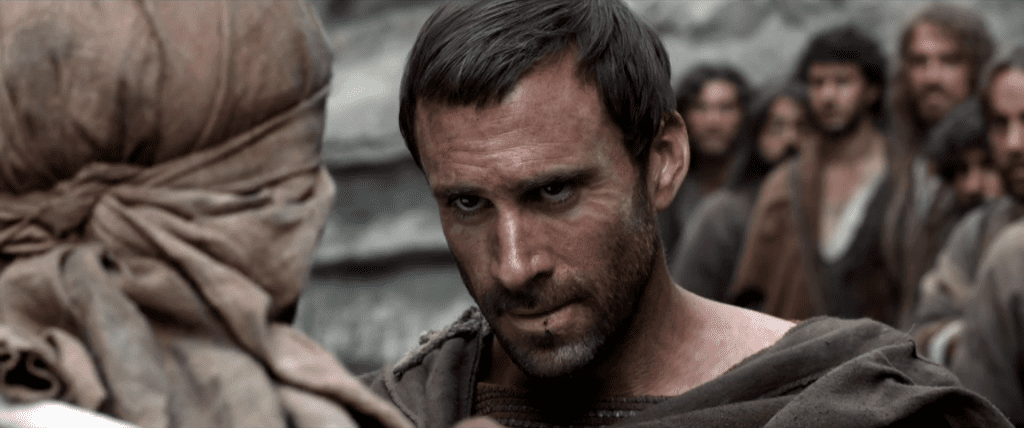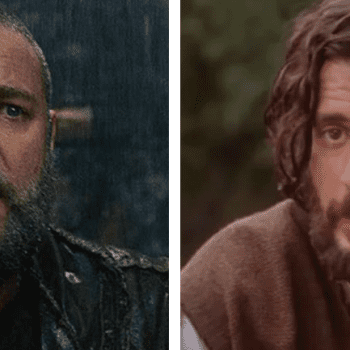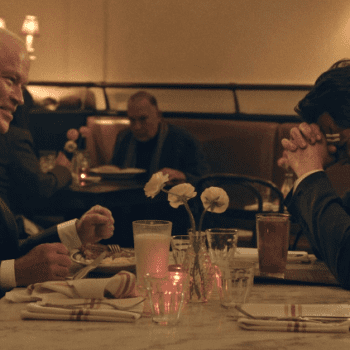Joseph Fiennes burst onto the scene nearly two decades ago in a pair of movies set in Elizabethan times: Elizabeth, in which he played the title character’s lover, and Shakespeare in Love, in which he played the title character himself.
Since then, Fiennes has kept busy in a variety of films, many of them period pieces — and lately, he has starred in a few films about famous Christians, such as the Reformation biopic Luther and the upcoming Eric Liddell film The Last Race.
Next month he’ll be seen in Risen as a Roman officer named Clavius who takes part in the death of Jesus and is then told to find the body after it vanishes from its tomb. Clavius is assisted in his quest by Lucius, a fellow soldier played by Tom Felton (who previously worked with Fiennes’ brother Ralph on the Harry Potter movies).
I had the opportunity to talk to Fiennes about Risen by phone last week. What follows is a slightly edited transcript of our conversation. (Warning: there are spoilers here, but nothing that you couldn’t have inferred from the film’s trailers.)
–
My understanding is that, about 20 years ago, you played Jesus himself in a stage production [of Dennis Potter’s Son of Man].
Fiennes: Correct. It was a production — or a play, rather — by a wonderful writer, I think one of our most extraordinary television writers. It was a time way before television was really as we see it today. His name is Dennis Potter, and he wrote plays such as Singing Detective and Pennies from Heaven, amongst others — and this was a play that was banned in the 1950s because Christ had never been portrayed onstage, and it went to court, actually, and there was an injunction on it. But eventually it was performed [on television in 1969], and I performed it with the Royal Shakespeare Company many years later. And what I loved about the play, for me — and maybe in the ’50s it riled a lot of people — but Christ was portrayed with having doubts, suffering from severe doubt, and what I thought was extraordinary about this piece was that it allowed me as an actor — and, I think, the viewers — to really connect with Christ as a human being. Because of course, as the Son of God — or in this case, Son of Man, as the play was called — if he is on Earth and in the form of a man, then he should suffer all the contradictions that we have within us, all the characteristics, and doubt was one of them. So that, for me, was a fascinating aspect to the play. But yes, a longwinded answer to your question: I played Christ many years ago.
That was 20 years ago, but did that experience inform how you approached Risen at all?
Fiennes: I don’t know if it “informed”, but I certainly think it had a big effect on me. It had a huge effect on the audiences, and you know, it’s undeniable and inescapable, what I witnessed onstage. In the play, we see the crucifixion, and the cross is built — it’s built by himself in the play, we did a production where he builds the cross himself out of wood, and then it’s erected — and it was a searing moment, and audences really across the board were very, very moved by the play, and I was moved and felt privileged to be a part of that. And stepping back into Risen, all these years later, I think it’s safe to say for the rest of the cast and especially Cliff Curtis [who plays Jesus], you enter into this with a sense of honour and respect. It’s rather like, whenever I walk into a church or a chapel, I’m overwhelmed by an atmosphere — an incredibly powerful, positive atmosphere — and I don’t know whether it’s thousands of prayers over the years that are in the fabric of the walls or what it is, but it’s the same when you enter this material. There’s an atmosphere to it. And I felt that the cast and our director and producers and the whole team was very cognizant of this, and it was a very special journey, even seeing this narrative play out cinematically through the eyes of a non-believer. And the effects of what he witnesses in the upper room halfway through the movie, this irrevocable moment that shakes him to the core, is very, very powerful. So as an actor, I’m very moved by the material.
There’s a verse in Matthew 28 that says the disciples saw Jesus in Galilee, and some doubted. That idea — that even some of those who saw the resurrected Jesus had their doubts — gets skipped over in nearly every Jesus movie I can think of, and one of the things I think is really interesting about Risen is the fact that, although you’re not playing one of the disciples, there is a scene where your character actually discusses with Jesus the fact that you’ve seen him and you still have doubts.
Fiennes: Yeah. I think you’ve — sorry for the expression — but you’ve hit the nail on the head. For me, that’s my favorite scene, and that is, whether you’re a believer or a non-believer, I think that is so integral to the movie, that one moment and that discussion. That, to me, is the most special point in the film. So I’m thrilled that you’ve pinpointed that.
I read somewhere that you and Cliff Curtis didn’t talk to each other at all prior to shooting your first scene together, and I was just wondering if that was the scene in question or was it the earlier scene halfway through the film?
Fiennes: That was the scene in question. The first moment that we had ever spoken was on camera, in that scene. We had been together for a number of months, traveling through Malta and into Spain, and that scene was shot in Spain, and I think we both had our methodologies as actors, and our way in. I personally kind of, off-camera, stayed true to my character, I wouldn’t give him space. And he had taken a vow of silence outside of the disciples anyway for the months that we were shooting, and it added up to bringing a greater amount of contact and chemistry when we did speak. So you’re right, we didn’t have contact — eye contact, verbal contact — physically in the same room. I would go out of the room if he came in. I wanted to save that connection in that moment. So yeah, it’s true.
What was it that drew you to this particular story when you saw the script?
Fiennes: Kevin Reynolds, I think, is a wonderful director, and I feel really privileged that he offered me the part. And when I read it, it was really the detective story. I had never seen a biblical movie with such momentum, the sense of a ticking clock, and I felt cinematically this was a beautiful device. I also loved the idea that we should visit a story that many of us know very, very well, and even if you know it a little bit, you’re going to get carried through the lens of a non-believer, a skeptic — and not only a skeptic but a man who was there and oversaw the death of Christ, the crucifixion of Christ. I thought was really exciting and original. And that was the hook that got me in.
It really is effective, the way the film sort of defamiliarizes the story, the way your character is bothered by the noise coming from that woman over there, and we know that’s Mary, but because it’s from your perspective, it’s kind of like– This is maybe an odd example to bring up, but Eric Idle, talking about Life of Brian, has talked about how there were scenes in there that were inspired by the idea that whenever something miraculous or significant happened, there would always be people who missed it because they were off Hoovering or something–
Fiennes: (laughs)
–and your character shows up late for the crucifixion, and it’s just another dead body to you, and I thought that was really interesting.
Fiennes: Yeah, you’re right. We meet him, you know, battle-weary, having just put down one insurrection, and he’s off to oversee a crucifixion of yet another would-be messiah, and then he’s charged to find the body because it’s another hoax — that [Jesus] will rise again — and it’s all a sort of PR exercise for the enemy. And so, yeah, it’s just another day at the office. And I love that sense that actually this huge revolution is going to hit Clavius right between the eyes, and for all of his brilliant military training, and for all of his surgical detective work and his intellect, nothing — nothing — can prepare him for the truth that he will witness. And we as an audience are waiting for that monumental kind of moment, and it happens in the upper room, and we see a man who’s deeply conditioned one day and then he’s undone the next, and he goes on that journey. But as you said earlier, and I think this is what a lot of people will kind of find interesting, is that sense of, even in the face of witnessing this, his intellect still blocks his kind of spiritual evolution, and I think that’s something many of us might struggle with, and it’s a wonderful point of discussion.
Reportedly, there was a subplot where your character had a Jewish mistress. Apparently she’s a major character in the novelization. Do you know why that was cut from the film?
Fiennes: I don’t know why. There was an amazing moment in a scene where she is brought in, unbeknown to Clavius, with the disciples, as someone that has been seeing a shadowy character. Maybe this shadowy character, as Lucius says, is someone we should be investigating, and it happens to be that that shadowy character is Clavius. So he ends up having an interrogation with the woman that he loves, and the interrogation is being overseen by another officer, Tom Felton’s character, so there’s this wonderful moment where there’s this dialogue, and then there’s this subtext to the dialogue. And also, she learns for the first time that he’s not just a Roman soldier but he’s a high-ranking military soldier, and she’s caught up in his investigation. I think this is where it comes down to timing and where it comes down to sticking to maybe more scripture and less fictionalization, and it’s always been a discussion of getting that balance right, honouring the story and being creative but not diverting too much. So maybe it was felt that this was a deviation too much, although I really enjoyed that component of the film. But sadly, that’s what happens in the cut.
In addition to Risen, you also starred a few years ago in a movie about Martin Luther. Is the “faith-based” movie thing becoming a pattern, or a habit?
Fiennes: Not consciously! I just jump to material that speaks to me. I don’t know, it’s very curious to me. But I just played Eric Liddell, who for me is a saint, a missionary that died in a Japanese concentration camp and is famously remembered in the film Chariots of Fire. And I don’t know why. Martin Luther brought the Reformation, maybe a hundred years before it was due. What is it with these characters? I guess what it is is maybe there’s a component where if we set ourselves a standard — whether it’s of integrity or a moral standard, or a discipline, a positive kind of discipline — we immediately invite forces that want to undo that, and I look to these characters, either fictional or true, that have raised the bar of their integrity and stuck by it and have weathered the storm. And maybe there’s a part of me that loves and searches for those rocks on which to bring about my self-evolution, I don’t know.
Your brother Ralph also did the voice of Jesus in a stop-motion animated film some years ago. Did you talk to him at all about that, the experience of doing a film in that genre?
Fiennes: I haven’t. That was the Pharaoh film.
He did the Pharaoh in The Prince of Egypt, but he also did the voice of Jesus in The Miracle Maker.
Fiennes: Oh, I see. Well then that’s new to me, I didn’t know that. I knew of the Pharaoh, but I didn’t know that. So as you can see, I haven’t spoken to him, because I didn’t know about it! So that answers that. But no, no, and in all honesty, when we get together, we don’t really talk shop, we talk sort of family and children and things like that. (laughs)
That makes sense. Last question: With Risen coming up a month from now, what do you hope audiences take away from it?
Fiennes: Great question, and maybe this doesn’t accurately answer your question, but what I would love is that audiences, both from a faith-based and a non-faith-based and a cinephile audience could all fill the auditorium and share the space together, and harmoniously enjoy the cinematic feast that is both true to scripture and creatively wonderful. Because there’s so much kind of polarization between something that’s too conservative or something that’s too revisionist, and my dream is this is maybe one of the first times that we get everyone in the room together, and happily so. So that would be my dream.
–
Risen opens in theatres across North America on February 19.













